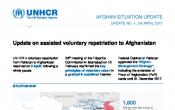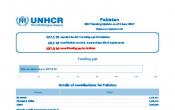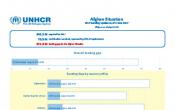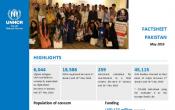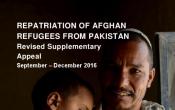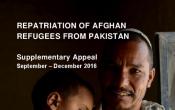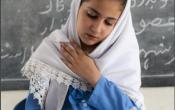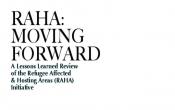Pakistan
Operation: Pakistan
Location
{"longitude":69,"latitude":30,"zoom_level":0}
Latest update of camps and office locations 21 Nov 2016. By clicking on the icons on the map, additional information is displayed.
Key Figures
| 2016 end-year results | |
| 100% | of people of concern had access to national primary health care |
| 100,000 | children were registered and issued documentation under regular birth registration procedures |
| 1,270 | people of concern were trained on sexual and gender-based violence (SGBV) prevention and response |
| 47 | education facilities were constructed or improved, and the strategy to promote admission to national education system was established |
| 20 | litres of potable water was made available in camps per person per day |
| 2017 planning figures | |
| 76,000 | Afghan children with proof of registration (PoR) cards will be enrolled in primary education |
| 60 | health facilities will be equipped, constructed or rehabilitated for Afghan PoR card holders and host communities |
| 20 | liters of potable water will be made available per person per day for Afghan PoR card holders and host communities |
| 15% | of Afghan youth aged 15-24 with PoR cards will be enrolled in certified livelihoods training |
Latest Updates
People of Concern
26%
Decrease in
2016
2016
| 2016 | 2,510,749 |
| 2015 | 3,390,353 |
| 2014 | 2,962,782 |

[["Refugees",1352560],["Asylum-seekers",4856],["IDPs",448956],["Returned IDPs",704370],["Returned refugees",7]]
Loading ...
Pakistan
< Back
2016
{"categories":[2012,2013,2014,2015,2016,2017],"budget":[136.595434619,161.35432216,162.48358814,136.70262985,137.352355659,127.07320187],"expenditure":[75.57044535,60.30982274,64.49818564,64.26438087,54.72576009,null]}
{"categories":[2012,2013,2014,2015,2016,2017],"p1":[53.963278549,59.97018945,57.67569721,58.40259877,68.04881327,63.73213975],"p2":[0.87699208,1.48910797,0.21242026,0.30424051,0.23462954,0.235],"p3":[28.78651901,59.67971779,60.84901445,49.6136171,50.34262892,59.04825415],"p4":[52.96864498,40.21530695,43.74645622,28.38217347,18.726283929,4.05780797]}
{"categories":[2012,2013,2014,2015,2016,2017],"p1":[30.17550455,30.48784343,33.37477024,27.95927853,31.68652771,null],"p2":[0.87261709,0.0786895,0.18566753,0.2060976,0.15099556,null],"p3":[13.24783863,13.69849557,9.8252259,18.78861072,16.56428054,null],"p4":[31.27448508,16.04479424,21.11252197,17.31039402,6.32395628,null]}
Loading ...
CHOOSE A YEAR
- 2014
- 2015
- 2016
- 2017
Working environment
For nearly four decades, Pakistan has been hosting millions of Afghan refugees with 1.3 million of them still remaining in the country. In the course of 2016, protection space was challenged significantly by heightened security and the evolving regional political environment. In this context, there was a sudden surge of return of Afghan refugees and undocumented Afghans during the second part of the year. The implementation of the National Action Plan, the country’s anti-terrorism measures, enhanced border control measures and proactive call by the Afghan government for refugees to return played a role in refugees’ decision making. There were also reports of harassments towards Afghans despite the effort by the government to raise awareness on the protection of refugees. By the end of the year, over 370,000 refugees were deregistered for repatriation and received cash grants upon arrival in Afghanistan.In the meantime, the government continues to implement its plan for solutions for internally displaced people (IDPs) with progressive “denotification” of conflict-affected areas in the Federally Administered Tribal Areas (FATA), allowing IDPs to return.
Population trends
- 370,000 Afghan refugees, with Proof of Registration (PoR) cards repatriated to Afghanistan in 2016.
- 1,397,000 Afghan refugees PoR card holders remained in Pakistan as of end 2016.
- 704,000 IDPs returned to their places of origin, bringing the remaining IDP population down to 449,000 at the end of 2016.
Achievements and impact
- UNHCR provided assistance to returning refugees through two voluntary repatriation centres in Khyber Pakhtunkhwa and one in Balochistan.
- A total of 174,000 children under the age of 5 were registered, twice as many when compared to 2015, and 113,000 birth certificates were issued, more than twice as many compared to 2015
- More than 46,000 refugees were assisted through ten Advice and Legal Aid Centers (ALAC), with UNHCR and its partners helping release 99.6 per cent of the people of concern who were arrested and/or detained.
- Primary education was provided to over 53,000 Afghan refugee children in 54 refugee villages through 275 public schools or education centers.
- Close to 170,000 Pakistanis and 66,000 Afghan refugees had access to quality healthcare facilities.
Unmet needs
- An estimated 20,000 to 40,000 refugee children could not access education.
- Additional investments are needed to ensure greater sustainability of community-based health services.
- The legal aid programme for refugees could have been implemented more effectively with additional ALACs.
More than 50,000 Afghan refugees voluntarily repatriated from Pakistan in the first eight months of 2015. The nationwide Proof of Registration card renewal exercise was completed in February 2015 and the extension of the card’s validity beyond December 2015 is currently under review by the Government of Pakistan.
In 2016, UNHCR will continue to support access to free primary education for some 76,000 refugee children in refugee villages, with particular efforts to increase girls’ enrolment and retention rates, including through the operation of home-based schools. With basic health units (BHUs) having provided services to nearly 580,000 patients in 2014 and over 320,000 patients in the first eight months of 2015, UNHCR will now implement its new health strategy aiming at gradually mainstreaming refugees into the national health care system.
The Refugee Affected and Hosting Areas (RAHA) platform will remain a priority as a burden-sharing mechanism for maintaining asylum space and enhancing community acceptance of refugees in peaceful co-existence. Projects in the sectors of health, infrastructure, livelihoods, water and sanitation, education and social protection will continue to be implemented across the country, benefitting both Afghan refugees and their host communities.
UNHCR will continue to support activities for people internally displaced in Pakistan as part of the inter-agency response, leading the protection, camp coordination and camp management, and shelter clusters. In-camp services will be provided to the most vulnerable members of this population. Protection monitoring and the operation of help desks will be pursued to detect protection challenges, provide information and facilitate civil registration and documentation. UNHCR is supporting the voluntary return of internally displaced people to the Federally Administered Tribal Areas (FATA), including through the provision of basic reintegration support.

